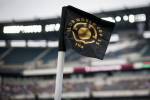“The ball is round”
Carlos Alberto Parreira arrives at his ninth World Cup — or tenth, depending on how you look at things — full of ideas on motivation and the certainty that there is more philosophical depth than might be imagined in an obvious phrase like the one quoted above from German football manager Sepp Herberger

Some people are concerned that the current Brazilian team is rather inexperienced. Seventeen of the 23 players in the squad — starting with the star player, Neymar — will be making their World Cup debuts. This means that only six have already done so. The goalkeeper, Júlio Cesar, is the only team member to have played in two championships. Pelé, the forward Ronaldo, the defenders Nilton Santos, Djalma Santos and Cafu, and goalkeepers Leão and Castilho took part in four World Cups. The Mexican goalkeeper, Carbajal, and the German midfielder, Lothar Matthäus, played in five. On the other hand, Brazil has a technical coordinator on its bench who can surprise even sport statistics fanatics with his wide experience. Carlos Alberto Gomes Parreira from Rio (71) is now completing his ninth World Cup. Or tenth, depending on the criteria you use. He himself almost lost count as he spoke on the evening before the Brazilian team started training in Teresópolis. As he sipped passion fruit juice on the terrace of his seafront apartment in Barra da Tijuca, in Rio de Janeiro, he needed to stretch his well-known memory of an elephant to the limit not to confuse the number of times. “Let me think a bit,” he said.
Parreira has a track record that is difficult to be beat. He has been manager of five countries in six World Cups. He has been involved in so many different circumstances that he has passed through heaven and hell: he won the title in one championship and got nowhere in another (see box below). He is followed by the Serbian coach, Bora Milutinovic, who has been in five World Cups and is one of the greatest nomads of the football world. Milutinovic was manager of Mexico, Costa Rica, the United States, Nigeria and China. Parreira comes second in terms of games played. He has notched up 23 (ten wins, nine losses and four draws), two less than Helmut Schön, the German manager between the World Cups in 1966 and 1978. The former Brazilian manager Zagallo has 20 and Felipe Scolari will complete 21 in July if he reaches the final or the third place. However, in his four competitions, Schön was manager of a team that invariably advanced through the competition stages and therefore played more games. In contrast, Parreira managed some teams which never got past the first stage and went out after only three matches, as was the case with Kuwait, the United Arab Emirates and South Africa. In one case, he did not even reach that figure. In an unprecedented event in his career, he was fired by Saudi Arabia in 1998 when the team lost the second game. The Saudis did not even give him the chance of a third game.
His involvement in the World Cup goes well beyond this unusual cartel. At the age of 27 (when he was actually younger than six of the players), he was a member of the backroom staff involved in preparing the players´ physical fitness in the 1970 competition when Brazil won the World Cup for the third time. Besides the technical excellence of the stars who have gone down in history, the World Health Organization praised the Brazilian team as being in the best physical shape of any of the 16 finalists. It was no coincidence that 12 of the 19 goals scored by Pelé and company occurred in the second half. Eight were scored in the last 25 minutes when the players were still going flat out. Parreira is proud of having made a contribution to that fabulous performance. He remained as a backroom staff member in the following World Cup. In 2002, he was a technical observer for Fifa as part of the Technical Study Group (TSG). His mission was to analyze the tactical schemes presented in the stadiums in South Korea and Japan. “My credentials even gave me the right to go onto the pitch and into any dressing room,” he said.
Parreira has been fluent in English since the time he was appointed manager of Ghana in 1967. He gained an African salary of US $ 100 a month (equivalent to US $ 700 in 2014). He has always done well in the task of dissecting opponents to explain how they play, defend and attack. He devours the main specialist international publications, studies technical reports, creates graphs, talks to foreign managers who usually call him Carlos, due to the difficulty of pronouncing his surname, and collects an enormous amount of images. Parreira paints in his spare time and is an art collector. He was blissfully happy when he acquired a painting by the modernist artist Cícero Dias from Pernambuco state at an auction some weeks ago. He is also a good photographer. Thanks to these skills, he believes he gave Carlos Alberto Torres a helping hand in crowning the triple Championship victory with a fantastic goal in the 4-1 victory over Italy in Mexico City. After spying on the Italians in the semi-final, Parreira presented the manager, Zagallo, and his team with a series of slides showing the man-to-man marking of the defenders. “The mid-field player Facchetti accompanied the outside right throughout the pitch,” he recalled. “At the end of the game, Jairzinho attracted him to the middle, opened room and, thanks to a pass from Pelé, Carlos Alberto was free to score.” He will never forget a comment by the mid-fielder Gérson on that triumph: “We won the game the previous evening”.
Parreira is passionate about self-help techniques and has learned how to develop them from one World Cup to another. He discovered in 2006 that was not just enough to motivate the players, as they needed to want to be motivated. “If you go to a banquet with a full stomach, you end up not eating, even the pheasant,” he said. This was a reference to the fact that 10 players in that team had won the championship in Yokohama four years earlier and may therefore have felt satisfied. Another factor was the bad shape of the well-fed forwards Adriano and Ronaldo. Adriano weighed 101 kilos and Ronaldo almost the same. “The player must be hungry, famished, like today´s group that has no world champions,” said Parreira who weighs 84 kilos and is 1.74 meters tall, while sampling seasoned cheese cubes. In previous competitions, he strictly followed the motto of the fourth winning championship campaign in 1994: “You only win the trophy by making zero mistakes and having maximum efficiency. Any mistakes and you go back home. It just needs one mistake, as happened in our defeats in 1974, 1978, 1982, 1986, 1990…”.

THE GURU – Sepp Herberger, Germany´s manager who beat the fabulous Hungary in 1954, always inspired him with sayings like “The most important game is the next one”
All this seems obvious — and it really is — but the pragmatic Parreira regards these concepts as a formula for success. His inspiration comes from Josef “Sepp” Herberger (1897-1977), the manager of Germany in four World Cups. Herberger won the 1954World Cup final against all forecasts by beating the fabulous Hungarian team. He had a number of standard phrases, including “Der Ball ist rund”, (“The ball is round”), “The game lasts 90 minutes”, or even “The most important game is the next one”. Another gem was “You need to attack and defend with the maximum efficiency”. For those who regard these “axioms”— some of which were quoted in the films Run Lola, Run and The Miracle of Bern — as nothing but clichés Parreira has a firm reply. “All the philosophy of football is summed up there although many people don´t understand it,” he said. “When the ball rolls, and it rolls because it is round, nobody can foresee what is going to happen. For this reason, the weakest can beat the strongest. The favorite wins in most cases because hierarchy prevails in football but to be a great team you need to achieve maximum efficiency in attack and defense, as Herberger preached. At one moment, Barcelona and Bayern Munich achieved this supreme objective. That is, in few words, what you have to do to win a game — or a World Cup.”



 SEGUIR
SEGUIR
 SEGUINDO
SEGUINDO

 A oferta de Alexandre Pato à família de Juliana Marins
A oferta de Alexandre Pato à família de Juliana Marins Copa do Mundo de Clubes: os times brasileiros que serão eliminados nas oitavas, segundo sites de apostas e IA
Copa do Mundo de Clubes: os times brasileiros que serão eliminados nas oitavas, segundo sites de apostas e IA Como era a vida de brasileira antes de viagem à Indonésia
Como era a vida de brasileira antes de viagem à Indonésia Quanto Flamengo, Palmeiras, Botafogo e Fluminense já arrecadaram na Copa do Mundo de Clubes
Quanto Flamengo, Palmeiras, Botafogo e Fluminense já arrecadaram na Copa do Mundo de Clubes O climão entre jornalista brasileiro e deputado dos EUA sobre ‘ditadura’ de Moraes
O climão entre jornalista brasileiro e deputado dos EUA sobre ‘ditadura’ de Moraes







